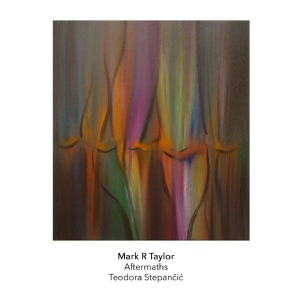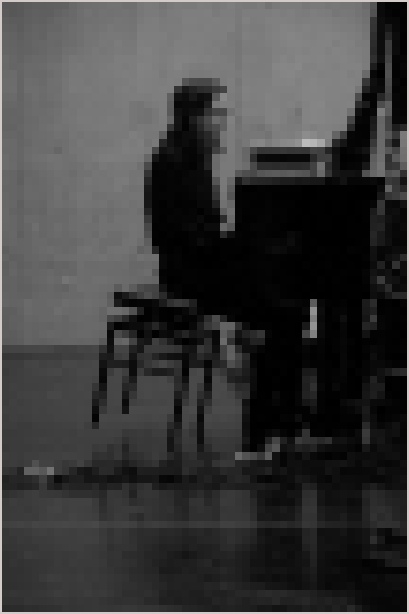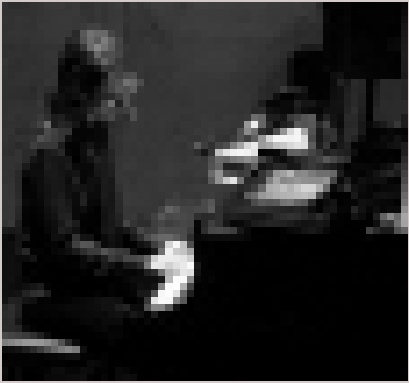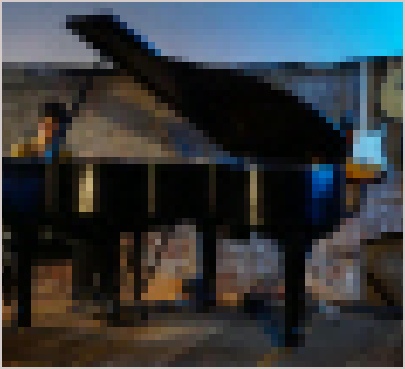Another Timbre TimHarrisonbre

at133 Mark R Taylor ‘Aftermaths’
Works for solo piano played by Teodora Stepančić
1 ‘For Alex Schady’ (2007) 3:10
2-4 from ‘Moments Musicaux Book 1’ (2011-12) 6:22
5 ‘Aftermaths Set One’ (2013) 5:18 Youtube extract
6-8 from ‘Moments Musicaux Book 4’ (2015-18) 5:59
9 ‘Aftermaths Set Two’ (2014) 3:26
11-18 from ‘Preludes Nos I-VIII’ (2011) 7:38
19 ‘For Marc Hulson V’ (1997) 3:27
21 ‘Second Nocturne’ (2015) 3:12
NB on the CD cover the final two tracks are listed in the wrong order - apologies!
Interview with Mark R. Taylor
What is your musical background, and how did you come to experimental music?
Born 1961, London. Began both playing the piano and writing music aged 4. ARCM Performer's
Diploma 1978; Regional Finalist, BBC 'Young Musician of the Year' Competition 1978;
concertos with local and national youth orchestras 1977-79. - But surely none of
this is really relevant?
I could joke that I read the Michael Nyman book when it came
out, and 'self-radicalised'. But those were the days when you could give yourself
quite an education - and I did - just by listening to Radio 3's 'Music In Our Time'
(Xenakis one week, Steve Reich the next...), and in fact by the time the Nyman book
appeared I'd already written 'Patterns 1' (1973) and 'Patterns 2' (1974). I realised
from his account of the work of Howard Skempton and Hugh Shrapnel that I was already
doing exactly what was being described: I was already an English Experimental Composer!
Yes, I self-educated partly through listening to Music In Our Time as well, though for some reason I assumed at the time that what was happening on the continent or in the States must be more interesting than what was happening in England. Do you see your music as belonging specifically within the English experimental tradition? And if so, how did that come about, given that you started so young and without really knowing there was such a tradition?
'English' not at the very outset, no: 'Patterns 1' stemmed from talk of vectors (I
knew what they were from school maths) in Xenakis. My reimagining was to realise
them in terms of 'distance travelled over the keyboard': and 'distance over the keyboard'
was going to be that much more apparent to an audience if the pianist was playing
only on the white keys. (Process apprehensible to an audience, and material going
in and out of phase, were obviously from Reich - and if you'd heard the opening of
Evryali when it was new, you could have been excused for thinking a confluence between
Xenakis and Reich was where the future was leading anyway!)
But then when I read Michael
Nyman's account of Hugh Shrapnel in particular (but also Howard Skempton) - the radical
simplicity, the patterning, the white-note-ish-ness - there was a real shock of recognition.
So did you go on to study music at college or university? And did new influences emerge there?
The 'new influences' were really in place earlier: Radio 3 (again) had broadcast eg Scelsi's 'Quattro Pezzi' in 1978, bringing crucial awareness of a different sort of 'minimalism' from Reich's.
My school wasn't confident of preparing pupils for Oxbridge Entrance in Music, but had a very strong Languages department, so my university scholarship was in Classics & Modern Languages. (Not in itself an impossible bar: you know Michael Parsons read Classics at Oxford!) But after one disobliging comment too many from my Classics tutor about the number of concerts I was giving, I changed to read Music. A well-stocked Music Faculty Library was a boon, but any real expansion of horizons in the early '80's was down to assiduous London concert-going, particularly eg to Adrian Jack's legendary series at the ICA, bringing unforgettable encounters with everyone from Horatiu Radulescu to Clarence Barlowe and Chris Newman.
‘Aftermaths’ is obviously all piano pieces. Is the piano central to your work as a composer, or have you written a lot for other instruments as well?
I am drawn - increasingly, actually - to other media, but it would be silly to deny
the centrality of my own instrument. (Well, if it was good enough for Chopin/Skryabin/Mompou/Finnissy.
. . .)
And its possibilities and, even now, potential - I used to joke (never having
had the connections to be invited there) that the piano was my IRCAM…
Stylistically your piano music seems to be fairly consistent across a long period of time, with a simple processual quality common to both early and recent pieces. Is that a fair comment, or have there been significant stylistic developments in your music that aren't immediately apparent?
Having precociously ingested minimalism, experimentalism, musique spectrale etc.,
by the time I was 18, my aesthetic was essentially formed - or at least all the elements
were in place. I've since then periodically pursued further exploration of one particular
aspect or another - the politically engagé in my vast anti-Thatcherite diatribe 'Victorian
Values', for instance (I regard the loss of Cardew as the paramount calamity to befall
British music) - with concomitant 'stylistic' implications in some cases.
Recently,
for all their possibly too-glib geometrical perfection, I've felt increasingly drawn
to try to recapture the purity of my earliest, rigorously systematic pieces. But
essentially the urge is, and long has been, syncretic, towards as internally-coherent
an idiom as possible. This remains very much an on-going agenda.
Is the desire to compose using an internally coherent system a way of limiting or containing the emotional effect of your music?
Not consciously limiting or containing, no, absolutely not. As I said, 'Patterns
1' was my own extrapolation from some of the music that most excited me (Xenakis
and Reich). As to accounting for that excitement, why an artist is drawn instinctively
to one aesthetic or another is surely a matter of deep personal psychology - the
attraction to rules and constraints (from Stravinsky's 'the more I am limited…..'
to Ferneyhough), what we would now call obsessive-compulsive tendencies (characteristic
of any number of my creative heroes, from Ravel to Wyndham Lewis), an over-developed
superego, one's relationship with one's father…..
What was conscious in intent, and
what I still value - unashamedly - in my earliest pieces is the neatness with which
any problematic dichotomy between form and content is tackled head-on, for instance.
Yes that makes sense. In fact I find your music very moving. Does it feel strange when you hear the music played by other pianists, given that you play them yourself?
'Strange'? No. Flattering and exciting, yes. And it's not as if it's never happened
before. One of my pieces, when it was new, was taken up by 3 different pianists,
and at one point had performances in 3 different countries in the space of 3 weeks.
And all this just from people hearing it, liking it and asking for copies: not from
any artificial hyping from a publisher. In fact I wondered if that kind of achievement
might actually attract the interest of a publisher. But of course it didn’t.
How did
the pianist Teodora Stepančić come to your music? And did you talk with her in detail
about interpretation, or did you take a more hands-off approach?
Teodora came into contact with my music via Richard Barrett, who has been a loyal supporter of my work for decades. When he moved to Belgrade and re-married, Teodora was part of his wife’s circle and Richard suggested to her that she might enjoy my music. Working with Teodora has encompassed a whole spectrum, from details down to the level of individual chords in some cases, to other instances of whole pieces where I simply trusted her to do what she wanted, without interference.
Could you tell me about the titles of some of the pieces on the CD? Some are clearly dedications to people you admire, others are more conventional pianistic titles, and others, well I'm not sure what they are....
Liliane Lijn, Alex Schady and Marc Hulson are all artists whose work has inspired me. Analogies between music and visual media -- and the uses that can be made of such analogies -- form one of my most long-standing aesthetic preoccupations.
As for Aftermaths: all puns intended, I'm afraid. If much modernist music used popularly
to be lambasted as 'mathematical', I suppose 'post-modernism' implies that we are
somehow past all that. That I might be beginning to find this regrettable you may
infer from my remarks about being increasingly drawn back to the convictions motivating
my very earliest mature works. I can hardly feel other than that, artistically speaking,
we have been left picking up the pieces in a situation where much contemporary music
would be a lot stronger if it were a sight more mathematical!
If Aftermaths, though, has a very faintly ironic tang, the 19th-century genre-titles
of some recent works evince what John White would call 'meta-irony'; the books of
Moments Musicaux borrow a designation from pieces by eg Rakhmaninov and Medtner which
I love, but refer also to Stockhausen's 'moment-form', consisting as they do of individual
fragments which can be differently ordered in performance. And EXPLICIT is the late-Latin
tag customarily translated 'Here endeth. . .' (the lesson, or whatever): this work
stems from reflections on loss (of a friend's wife, of my mother), and thus partakes
of what the author of the Tempo article on me describes as an entire 'genre of valediction'
(to which 'final music' also belongs).
My sense is that over the past ten years or so there has been a resurgence of interest in music in the experimental tradition that you identified with at the start of your composing life. Is that something that you have felt too, or do you feel far removed from the shifts and currents of the contemporary music world?
In your first point I'm sure you're right. I felt it most tangibly in my last generation of students, some increasingly drawn eg to the sort of multi-media manifestations one could think of as 'neo-Fluxus' (although they mightn't thank me for that term, any more than the Fluxus artists would have welcomed being dubbed 'neo-Dada').
But having said that, I have next to no personal interest in the theatrical, and
your second observation is equally true: I increasingly feel, if not at odds, then
certainly at an oblique angle to much around me - like a sort of Fauré in the age
of Satie (or Poulenc): while others are setting nonsense-poetry, or driving on to
stage in a small Citroën to receive applause for their ballet with its orchestra
of typewriters, I am at home, disillusioned and deaf, writing my Thirteenth Nocturne
- or, if you'll forgive an even more extreme simile, driven into internal exile,
like a sort of Sorabji of minimalism.
However, I am (mirabile dictu) not completely
disillusioned, certainly not deaf, and, so far, only up to five Nocturnes. . . .

Teodora Stepančić

